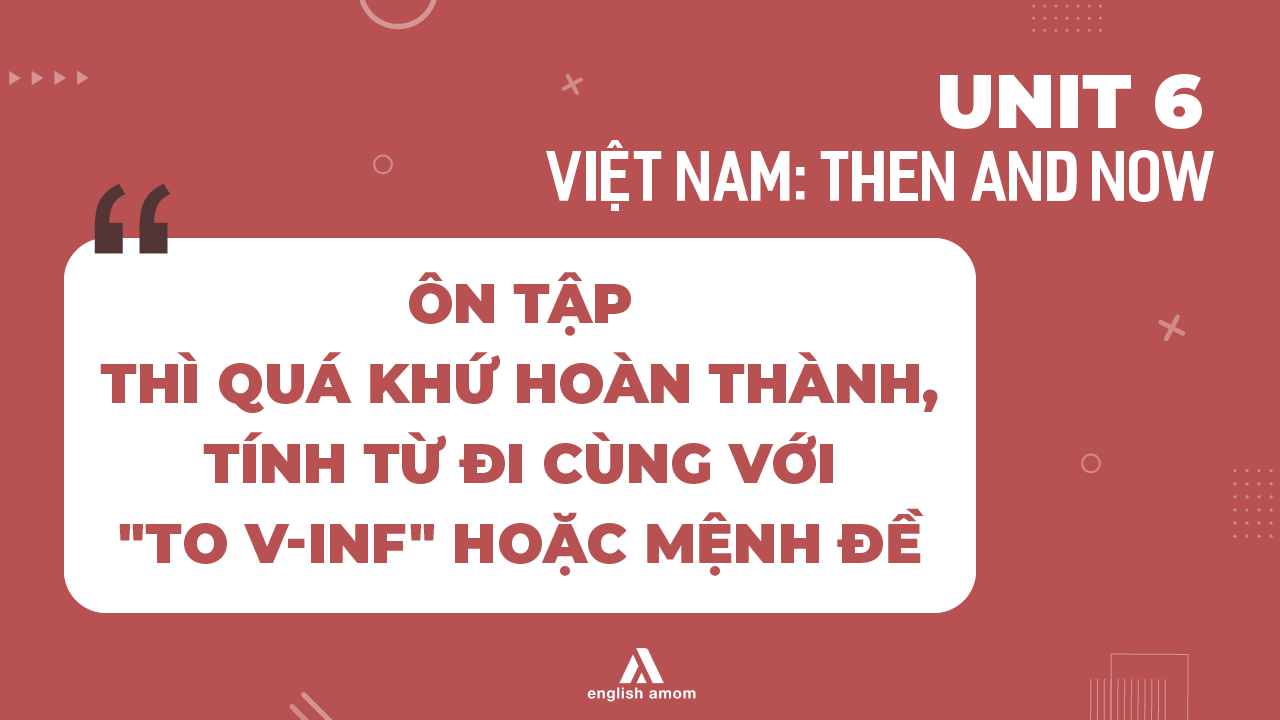
► Kênh hỏi đáp và giải thích thắc mắc kiến thức MIỄN PHÍ → truy cập LINK NHÓM: ENGLISH AMOM
► Kênh YOUTUBE hệ thống toàn bộ bài giảng CLIPS: truy cập LINK: ENGLISH AMOM CHANNEL
► Kênh TIKTOK: ENGLISH AMOM
I. LÝ THUYẾT
A) THÌ QUÁ KHỨ HOÀN THÀNH
Xem lại lý thuyết và làm các bài tập thực hành: Tại đây
B) TÍNH TỪ ĐI CÙNG VỚI TO VERB
► Cấu trúc tính từ + động từ nguyên thể không to có ý nghĩa "thật là thế nào để làm gì", "làm gì đó thì như thế nào" hoặc "thật như thế nào để ai đó làm gì", "ai đó làm gì như thế nào".
Ex: It was easy for him to pass the test.
► Công thức: It + be + adj + (for O) + to V
Ex: It is boring to go to the meeting.
It was dangerous for Peter to drive fast.
► Những tính từ thường gặp: easy (dễ) , difficult (khó), hard (khó), impossible (không thể), important (quan trọng), interesting (thú vị), necessary (cần thiết),...
C) TÍNH TỪ ĐI CÙNG VỚI MỆNH ĐỀ
► Cách sử dụng: Cấu trúc tính từ + mệnh đề đi theo that nêu lên ý "ai đó cảm thấy như thế nào về một sự việc".
Ex: It’s hard to believe that he failed the test.
► Công thức: S1 + be + adjective + that + S2 + V
Trong công thức trên, các tính từ có thể được chia ra làm hai nhóm:
- Nhóm cảm xúc tích cực: pleased (hài lòng), excited (thích thú), glad (vui lòng), amazed (ngạc nhiên),...
- Nhóm cảm xúc tiêu cực: sorry (hối tiếc), disappointed (thất vọng),...
Ex: I’m excited that you call me.
I was disappointed that I got bad marks in the exam.
► Những tính từ thường gặp: glad (vui lòng), sorry (hối tiếc), sad (buồn), shocked (sốc), delighted (vui lòng), pleased (vui lòng), happy (vui vẻ), anxious (lo lắng), surprised (ngạc nhiên), relieved (nhẹ nhõm) , afraid (lo sợ), worried (lo lắng), confident (tự tin), certain (chắc chắn),…
II. BÀI TẬP
1) Fill in each blank with the past perfect form of the verb in brackets ( Page 63)
1. Before the 1990s, trams (be)................ a popular means of transport in Ha Noi.
2. I won the game because I (play) ................ it a lot with my brother.
3. How long you (use) ................ your mobile phone before it broke down?
4. Before the invention of television, people only (see) ................ films at the cinema.
5. Before the 1990s, Viet Nam (have) ................ an old banking system.
6. Viet Nam (experience) ................ decades of fighting for freedom before the country became totally independent.
ĐÁP ÁN:
| 1. had been | 2. had played | 3. had you used |
| 4. had only seen | 5. had had | 6. had experienced |
5) Create one sentence by combining each pair of sentences using subject + be + adjective + that-clause ( Page 64)
1. We did well in the exam. We were relieved about that.
2. I am sorry about the school facilities our parents had. They were very poor.
3. Everyone was glad. The government had decided to invest more in education.
4. It will be much safer to have elevated walkways and underpass systems for pedestrians.
5. Life in the countryside has improved considerably. All of us are delighted about that.
ĐÁP ÁN:
1. We were relieved that we had done well in the exam.
2. I am sorry that our parents had very poor school facilities.
3. Everyone was glad that the government had decided to invest more in education.
4. Everyone is aware that it will be much safer to have elevated walkways and underpass systems for pedestrians
5. All of us are delighted that life in the countryside has improved considerably.

